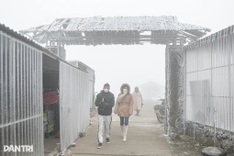The rising cost of living is hitting students especially hard, with those who come from rural areas to study in the city finding life extremely tough.
 |
| Rooms for rent in Cau Giay Disctrict are home to many university student in ha Noi. Rent, which account for a major percentage of a student\'s living expenses, have risen steeply sice Tet. — VNS Photo Doan Tung. |
First-year student at the University of Science and Technology Nguyen Dinh Duong said that since he recently moved to Hanoi, it wasn\'t the tall buildings and urban hustle and bustle that made his head spin – it was the extremely high prices.
Coming from northern Thai Nguyen Province, Duong said he now lives on Ta Quang Buu Street. He shares a small room that measures only 10 sq. metres with two friends.
"After the Tet holiday, my rent rose from VND1.2 million (USD58) to VND1.6 million (USD77)," he said. "And now the landlord is talking about another raise, to VND2 million (USD96) starting from April."
The reason for the latest rise in the rent is the hike in petrol prices, according to Duong\'s landlord.
"My roommates and I have decided to start cooking at home to save more money," said Duong. "We used to be satisfied with a meal that cost VND15,000 (USD0.7) but now, even a VND20,000 (USD1) meal barely satisfies us."
The rent stands to account for two-thirds of the monthly allowance Duong receives from his family, which is about VND3 million (USD144). The sum is considered quite large by rural students in Ha Noi, but Duong said it was still very difficult to make ends meet.
A classmate of Duong\'s at the University of Science and Technology, Nguyen Van Ninh, on the other hand, has it even tougher. Ninh has to survive on a monthly budget of VND1 million (USD48).
Living in the university dormitory has helped Ninh cut down his expenses, as he only has to pay VND130,000 ($6.25) per month for a roof over his head.
It is not convenient at all for 12 people to share a single room, sleeping in bunk beds. And it isn\'t very comfortable during the hot summer, but for Ninh and his room-mates, it is "good enough".
What worries Ninh is the continual rising cost of food.
"Dormitories do not allow home cooking so we have to eat out everyday," he said. "With between VND12,000 to VND15,000 (USD0.6 – 0.7) to spend on a meal, we usually eat tofu, dried fish and vegetables."
The constant money worries push students to find ways to make money while continuing their studies.
Ninh, who says he hopes to get a scholarship next year, also works as a maths tutor, a part-time job that earns him VND300,000 (USD12) for two classes a week.
More and more first-year students are looking for work, but for many a lack of experience means they can only work as waiters or sales assistants.
Many hope to be tutors, as this brings a better income than working at coffee and clothes shops to earn VND800,000 to VND1,000,000 a month (USD38 – 48).
Tran Thanh Nga, from the University of Ha Noi, teaches English to a 14-year-old girl to earn nearly a million dong each month.
According to Nga, getting this job was not as easy as people may think since students who are new to Ha Noi have few connections to help them find work. And it\'s not easy to win the employers\' trust either.
A teacher from the Foreign Trade University warns against pushing students to work while they study, as many working students find themselves already exhausted by the time they turn up at their lectures.
She suggests universities promote appropriate part-time jobs to students so that they can balance study and work while ensuring a healthy lifestyle.




















